HIT CHANNEL EXCLUSIVE INTERVIEW: August 2018. We had the great honour to talk with a legendary musician: Paul Rudolph. He is best known as the lead guitarist and founding member of Pink Fairies and the person who replaced Lemmy (bass) in Hawkwind in 1975. He has also recorded with The Deviants, Brian Eno and Robert Calvert. Pink Fairies just released their latest studio album, “Resident Reptiles”. Read below the very interesting things Paul told us:
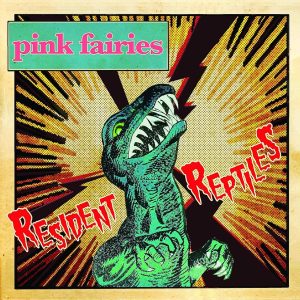 How did you come up with the idea to make a new Pink Fairies album?
How did you come up with the idea to make a new Pink Fairies album?
Basically, the idea started with Nik Turner (ed: saxophone, flute, vocals) from Hawkwind. He introduced me to Matt at Cleopatra Records. I released old Pink Fairies stuff to Cleopatra and then Matt at Cleopatra said: “Would you ever consider doing some newer Pink Fairies stuff?” and I said: “Yes. What do you have in mind?” And he said: “We can book a studio in Austin. I’ll get Alan”, who played bass in Hawkwind after I left the band. We got Alan Davey to play bass and Alan was good friends with Lucas Fox, who is the original Motörhead drummer. So, ultimately we booked the time and we all had never met before. We just met the night before the sessions in Austin, Texas and when we went to the studio, we just started recording.
How important was the role of Jürgen Engler of Die Krupps as the producer of “Resident Reptiles”?
Jürgen was the producer and he also played a little bit guitar and did some singing. He was an awesome, nice person to have there. Very inspirational.
Will you tour for “Resident Reptiles”?
I’m not sure about that. We’ll see, because I live in Victoria, Canada. Alan Davey lives in California. Lucas Fox lives in France. So, I don’t know if there is gonna be a tour or not. We were thinking we might do a couple of gigs, somewhere, but I don’t know about a tour. We will see. It depends if there is a lot of demand or a live performance we would certainly consider of.
What was the musical vision of Pink Fairies in 1970?
In the beginning, we were doing a lot of just improvised rock, free festivals, just to be able to play and have fun. There was a certain element of social comment about the whole thing. I guess we were young, wild and crazy (laughs).
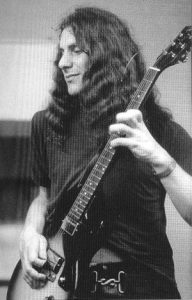 What memories do you have of your free performance outside the Isle of Wight Festival in 1970?
What memories do you have of your free performance outside the Isle of Wight Festival in 1970?
I remember that well. That was a lot of fun. We originally showed up there and the promoter of the festival, basically gave us and Hawkwind a generator because the festival was so loud. I think there was an estimate of about 30.000 people outside the festival who either couldn’t get in because it was full or couldn’t get in because they didn’t have any money. So, the promoter gave us a generator as a way to try to keep people occupied outside and not to try to tear down the walls of the festival and get in for free.
Are you proud that “Never Never Land” (1970) is considered a cult album?
Very proud, yes. In the early days of the Pink Fairies there was very much a cult following and we used to do a lot of gigs on the same bill as Hawkwind, so we all shared a lot of the cult following.
What was the fans’ reaction when you played “Uncle Harry’s Last Freak-Out” live?
People loved that. “Uncle Harry” was different every time it was played. That was one of the funny things about the Pink Fairies. We were able to do a lot of improvising and not have to play the same thing in the same way every night. We would get a lot of attention from the people in the audience. We would pick up on our energy and the audience was as much a part of the gig as the band was. Probably more so, in a way. We would start playing and the band was just a medium for the pure energy.
Did you have fun when John Bonham (Led Zeppelin) jammed with Pink Fairies at Mothers Club in Birmingham on 8 November 1970?
I can’t remember the gig at the Mothers Club in Birmingham (laughs). I don’t remember. I don’t remember anything about that. I remember one of the first concerts that I played in England, after I moved there from Vancouver, Canada when I joined The Deviants. We played an outside concert in Birmingham and the warm up band was the Black Sabbath. There were just starting. But I don’t remember that concert at Mothers Club.
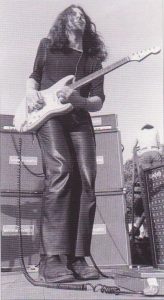 Why Pink Fairies covered “I Saw Her Standing There” (The Beatles) on “What a Bunch of Sweeties” (1972)?
Why Pink Fairies covered “I Saw Her Standing There” (The Beatles) on “What a Bunch of Sweeties” (1972)?
The reason we did it was because we used to do it live. It was a good number live and when we were doing “What a Bunch of Sweeties” we decided to put it on the album because we all liked playing it. I think also it was a little bit of filler for the album to make just one more track to it. “What a Bunch of Sweeties” was kind of a hard album to record, because we were trying to influence Polydor to let the band record live, because Pink Fairies was a live band, not a studio band and the magic would happen when the band would play live. So, for me some of the studio stuff for the Pink Fairies turned out really well, some of that I don’t think it turned out that well, because it just didn’t have the spark and the spontaneity that would happen when the band played live. But they insisted on keeping control over what the band was doing, so they wouldn’t let us do some live recordings, which I think it’s a real pity.
Do you agree with the term “proto-punk” as far as the music of Pink Fairies?
I think the Pink Fairies was one of the first punk bands. Johnny Rotten (ed: Sex Pistols –vocals) himself mentioned after the Sex Pistols had their No.1 hit, he was asked about what gave the idea for this song, this music and this whole new culture and he said that he got the music in a Pink Fairies concert, with some of the numbers that we used to do live like “The Snake” and “Do it”. More so “The Snake”. I can hear the origins of a lot of the punk stuff in that song. We were very honoured to be the forerunners of that movement. A lot of people would refer to us, at that time, as “psychedelic punk” and Hawkwind were the “space punk”.
Are you still in touch with Twink (Pink Fairies, Tomorrow, Pretty Things, Syd Barrett’s Stars –drums)?
No, I’m not. I’m not in touch with Twink. We ‘ve emailed a few times over the last several years, but I just don’t keep in touch with him, because I was involved in a lot of other things.
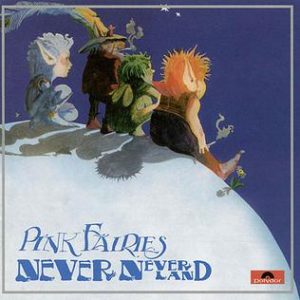 Were you surprised when Hawkwind asked you to replace Lemmy in May 1975?
Were you surprised when Hawkwind asked you to replace Lemmy in May 1975?
No, I wasn’t surprised. We all were really good friends. I knew the band well, I knew the music well and I was pleased to be invited to join the band.
Were you satisfied with the result of Hawkwind’s “Back on the Streets” (1977) single you co-wrote with Robert Calvert?
Yes, I very much like “Back on the Streets Again”.
Are you aware of the popularity of your song “Hassan I Sabbah” (from Hawkwind’s “Quark, Strangeness and Charm” -1977) in Greece?
I am aware of that because I get this list twice a year from the publishing companies and “Hassan I Sabbah” is way-way above of all other tunes in popularity. It’s needless to say I loved working with Bob Calvert and writing that song.
Was Robert Calvert (Hawkwind –vocals) an easy-going person to work with?
He was very easy-going person. Very creative. I would say that aside from working with Bob doing his solo albums, which was awesome; working with Bob, with Brian Eno producing (ed: “Lucky Leif and the Longships” -1975), was extra awesome. It was very-very alive, creative and spontaneous.
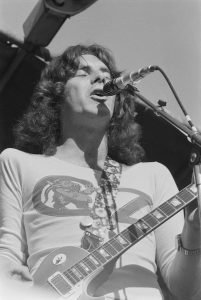 Why did you leave Hawkwind in early 1977? Calvert said that Allan Powel (drums) and you tried to introduce a funky style.
Why did you leave Hawkwind in early 1977? Calvert said that Allan Powel (drums) and you tried to introduce a funky style.
Yes, we were trying to introduce a bit more rhythm and direction to the band, but I think there were some band members who didn’t like that direction. At that time, there was just a general animosity in the band, where people were just not getting along. I think up until that time in history, Dave Brock (guitar) was very much in control of the band. I don’t think he liked the direction things were going in. The “Astounding Sounds” (1976) album that was produced by David Gilmour was a bit of a different departure for the band. I think it was the result of different people having different influences and it just built up a friction and it led to some of us leaving the band. There was a lot of dysfunction in the band. I don’t know if you can print this or not, but there was a lot of drug taking of different types. I think everybody was getting a little crazy.
Was it an interesting experience to play on four Brian Eno albums (“Here Come the Warm Jets”, “Another Green World”, “Before and After Science” and “Music for Films”)?
That was an incredible experience and an honour to work on that, the four Brian Eno albums. That was the most creative fun I ever had in the music business.
Did you get on well with Robert Fripp (King Crimson) when you both played guitar on Brian Eno albums?
Playing with Fripp was fine. We got along well. It was complementary and creative. It was very interesting that on one of the tracks that we both played lead guitar on –I guess we have slightly different styles- in the final production Eno was sitting at the mixer and just pressing the channel on and off above Fripp’s guitar, so when you listen to it, it sounds almost like one player except the octaves and everything of the style that we all kind of envy each other’s. Rather done by a slicing tape, it was done by pressing the channel up and down in the mixer and I thought it worked really well. It was nice to work with Robert Fripp. I went to see him two years ago when he and King Crimson played in Victoria, but he wasn’t accepting any visitors.
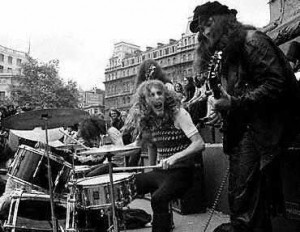 In July 1968 your band The Hydro-Electric Streetcar opened for The Doors at Pacific Coliseum in Vancouver. Do you remember that show?
In July 1968 your band The Hydro-Electric Streetcar opened for The Doors at Pacific Coliseum in Vancouver. Do you remember that show?
Absolutely! It was incredible! The Pacific Coliseum had just been built, so we were the first band that actually played music in it. We got to briefly meet The Doors and it was very inspirational to see a young Jim Morrison and hear the band play there.
What was it like to be a member of the UK Underground scene in the Ladbroke Grove?
It was really cool. Ladbroke Grove at that time was very tribal. A lot of us knew each other. A lot of musicians lived there. We ‘d go over in afternoon and jam with each other in different people’s places. It was a really great cultural experience. We would put on free outside concerts on Ladbroke Grove and we ‘d take turns every weekend with Pink Fairies, Hawkwind and few other bands and every alternate weekend the Jamaicans would set up their huge mountains of speakers to do reggae. So, one weekend we would have the underground rock and one weekend we had the reggae in the alternate back and forth. It was really cool. A lot of culture.
Do you have any memories of your performance with the Deviants on the steps of St Paul’s Cathedral in May 1969 (see main photo by Robin Morrison)?
That was a gig that was arranged because the St Paul’s Cathedral was having either a week or a month of raising money to do restoration of the cathedral. I don’t remember who got us to gig but I remember we showed up, loaded all our equipment out on the steps, right at lunch time. When we started to play thousands of people gathered and once there was a huge crowd, some of the people from the cathedral came out with their collection plates and I think they got about 20,000 dollars or pounds. They raised a lot of money, but it was really great playing there, because we met the vicar and a lot of dignitaries and playing there was such a cool thing to do.
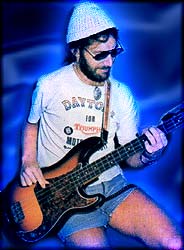 Do you think you should have received more recognition as a guitarist? Mick Farren (underground journalist and The Deviants vocalist) wrote in the NME that when you stretch out you are one of the best players in the Hendrix tradition. Unfortunately that’s when you stretch out.
Do you think you should have received more recognition as a guitarist? Mick Farren (underground journalist and The Deviants vocalist) wrote in the NME that when you stretch out you are one of the best players in the Hendrix tradition. Unfortunately that’s when you stretch out.
I like very much playing in the Hendrix tradition. I also like a lot of heavy metal and a lot of punk. Pink Fairies were the best band that allowed me to stretch out and lately because I have a recording studio at home, I am always recording stuff. The album we did in Texas that is coming out tomorrow, August 24th, that was a bit of stretching out, but it was more collaboration of the three people, who were there. Alan Davey is now mixing the Hawkwind reunion album that I recently finished doing guitar on. That’s got a lot more stretched out guitars and ideas on it.
Are you currently involved with other projects?
Having just finished the Hawkwind reunion project, I now have a few other projects that I am gonna start to do with Alan Davey. I want to do more stretched out psychedelic rock with a sort of metal/punk edge and then I am also thinking of doing –and Alan is gonna be possibly involved- punk and metal cover tunes of old country and western songs, which may sound completely crazy. Part of the idea was that a lot of the old country and western songs are very sweet, they sing them with a very sweet voice, but they are singing about people getting killed and trapped by horses. Maybe we will even write some new ones. A lot of the genre I thought that it would be very interesting if it had more edgy music. Because it was all about cowboys, land and horses. Alan Davey living in California, he loves the desert, horses, guns and things like that (laughs). It’s just an idea we want to play around with. Cleopatra has called us and I only will come up with some good demos. They are behind us doing anything.
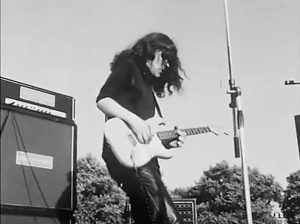 Future Queen producer Roy Thomas Baker was an engineer on “The Deviants 3” (1969) album. Did you expect that he would become so famous?
Future Queen producer Roy Thomas Baker was an engineer on “The Deviants 3” (1969) album. Did you expect that he would become so famous?
No, I didn’t (laughs). But you know, with recording -certainly with parts of the recording that I’ve done with The Deviants, the Pink Fairies, Brian Eno and doing the stuff in Austin (ed: “Resident Reptiles”)- the engineers were very much a part of the band and they made a big difference in how all songs turned out and they had a lot of influence.
Were you an anarchist? Brian Eno sold the anarchist magazine “Freedom” in the streets of Ipswich. Did you know that?
No, I had no idea (laughs). I, myself was never an anarchist. In the early Pink Fairies days, this is actually before Pink Fairies, Mick Farren was very much the anarchy person. He wrote a lot of articles as such for the International Times, which was a newspaper in London.
Main photo by Robin Morrison
A huge “THANK YOU” to Mr Paul Rudolph for his time and to Billy James for his valuable help.
Buy the new Pink Fairies album, “Resident Reptile” here: https://cleorecs.com/store/shop/pink-fairies-resident-reptiles-cd

